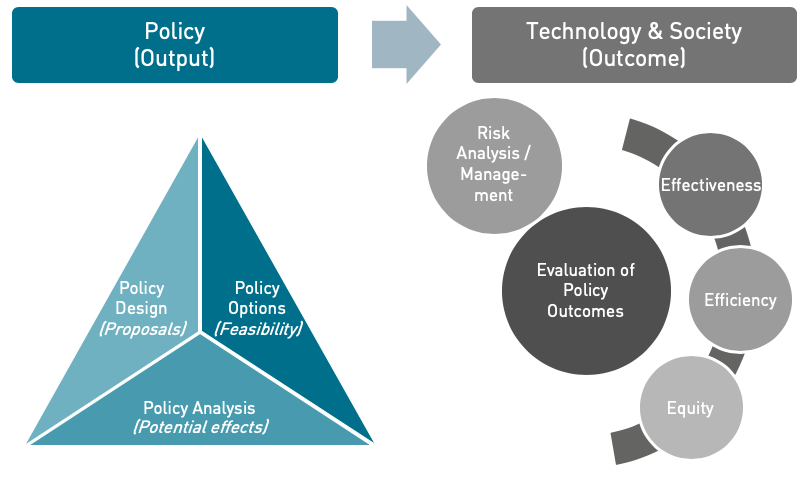CAS TPP: Impact Analysis
Next start in January 2026. Application window is open from 15 August 2025 to 15 November 2025

Learning objectives
The Certificate of Advanced Studies in Technology and Public Policy (CAS TPP): Impact Analysis degree equips participants with essential skills in technology and public policy analysis. The primary focus lies on assessing technology-related policy options in terms of their expected and actual effects.
As shown in the below figure, the CAS TPP: Impact Analysis focuses on the interface between policy (the output of the policy process, such as laws and regulations) and the effects of such policies on technology and society (outcomes).

The learning objectives of the CAS TPP: Impact Analysis degree are to equip participants with skills that are essential for:
- designing policy interventions based on systematic analyses of their expected economic, social, and political consequences before implementation (ex ante policy analysis);
- evaluating how implemented policy interventions perform in terms of their actual effectiveness, efficiency, and equity (ex post policy analysis).
The programme combines general skills in policy analysis with opportunities to apply these skills to each participant's set of technology-related knowledge and policy problems in their professional field (e.g., mobility, energy, public health, the digital space, urban planning, environment / sustainability, security).
Structure & Schedule
The CAS TPP: Impact Analysis degree is only offered in the spring semester of even years (e.g., 2024, 2026), taking place between the end of January and the middle of June.
The degree consists of three modules that are taught in 21 days of in-person classes, organised into approximately 10 blocks of two or three days each. The programme is worth 15 ECTS, which equals around 450 hours of workload in total. The credits reflect the total workload, including preparation and follow-up. Please note that the individual submodules and lectures can be subject to change.

Module 1: Economic Foundations for Policy Analysis
Markets play an important function in modern societies by allocating resources and capital. Yet, important market failures require the intervention of public policy. This module introduces the fundamentals of micro- and macro-economics and thereby lays the foundation for the economic assessment of policy interventions.
Participants understand (1) what ex ante and ex post policy impact analysis is, (2) in what forms and with what methods they can be undertaken, (3) why they are important for evidence-based policy-making.

Prof. Dr. Tobias Schmidt
Professor of Energy and Technology Policy and
TPP Programme Deputy Director

Prof. Dr. Thomas Bernauer
Professor of Political Science and TPP Programme Director
Participants (1) understand basic principles, problems and approaches in microeconomics, (2) can analyse and explain simple economic principles in a market using supply and demand graphs, (3) can contrast different market structures and describe firm and consumer behaviour, (4) can identify market failures such as externalities related to market activities and illustrate how these affect the economy as a whole.

external page Prof. Dr. Dominique Foray
Professor of Economics and Management of Innovation, EPFL

external page Dr. Nina Boogen
Researcher at the Center for Energy and the Environment, ZHAW
Participants understand (1) the behaviour of macroeconomic variables, such as gross domestic product and unemployment, (2) why national economic activity fluctuates, (3) what economic policy can do to promote innovation or to fight unemployment, (4) what significance international economic relations have for specific countries, such as Switzerland.

Prof. Dr. Jan-Egbert Sturm
Professor of Applied Macroeconomics & Director of the KOF Swiss Economic Institute, ETH Zurich
Module 2: Technology and Policy Analysis
Technologies substantially affect the way we live and how our societies function. Technological change, i.e., the innovation and diffusion of new technologies, is a fundamental driver of economic growth but can also have detrimental side effects. This module introduces methods to assess technology-related policy alternatives and to analyse how policies affect technological changes and society.
Participants understand (1) how to perform policy analyses related to technology, (2) policy challenges, ethical considerations and the rationale for policy intervention, (3) how to select appropriate impact categories and methods to address a policy problem through policy analysis, (4) how to assess policy alternatives, using various ex ante policy analysis methods, (5) and how to communicate the results of the analysis.

Dr. Alessandro Blasimme
Senior Scientist at the Health Ethics and Policy Lab,
ETH Zurich

Dr. Florian Egli
Senior Researcher and Lecturer at Energy and Technology Policy Group,
ETH Zurich

Prof. Dr. Matthias Leese
Assistant Professor for Technology and Governance,
ETH Zurich

Prof. Dr. Tobias Schmidt
Associate Professor of Energy and Technology Policy &
TPP Programme Deputy Director, ETH Zurich

Prof. Dr. Bjarne Steffen
Assistant Professor of Climate Finance and Policy,
ETH Zurich
Participants understand (1) when and why policy outcomes can be evaluated based on observational or experimental methods, (2) basic methods for evaluating policy outcomes (experimental, qualitative and quantitative approaches), (3) how to apply concepts and methods of policy outcome evaluation to specific cases of interest.

Dr. Adina Rom
Executive Director of ETH for Development (ETH4D),
ETH Zurich

external page Dr. Deborah Kistler
Research Coordinator,
University of Zurich

Prof. Dr. David Kaufmann
Assistant Professor of Spatial Development and Urban Policy,
ETH Zurich

Dr. Michael Wicki
Senior Researcher at the group Spatial Development and Urban Policy (SPUR), ETH Zurich

external page Dr. Regina Witter
Deputy Director of Agglomeration Traffic,
Federal Office for Spatial Development (ARE)

Dr. Andreas Beerli
Postdoctoral Researcher at the KOF Swiss Economic Institute and the Immigration Policy Lab, ETH Zurich

external page Prof. Dr. Philipp Trein
Assistant Professor of Public Administration and Policy, University of Lausanne
Participants understand (1) why "big data" techniques for making policy-relevant assessments and predictions are useful, and under what conditions, (2) key techniques in this area, (3) ethics in relation to data processes.

Prof. Dr. Elliott Ash
Assistant Professor of Law, Economics, and Data Science,
ETH Zurich

external page Dr. Johan Rochel
Co-Founder and Co-Director ethix: Lab for Innovation Ethics & Postdoc Researcher, EPFL and University of Zurich
Module 3: Policy-Making in Practice
Effective management of risks and uncertainty as well as communication of scientific evidence to stakeholders and policy-makers are essential for successful policy-advice and policy-making. Hence, this module conveys the fundamentals of risk analysis/management and of writing for policy-makers. Besides an academic perspective, it features practitioners working at the technology-policy interface.
Participants understand (1) the role risk and uncertainty play in decision- and policy-making, (2) common approaches to risk management, (3) how to apply methods of quantitative risk analysis, (4) how to communicate risk information clearly and effectively.

Prof. Dr. David Bresch
Professor for Weather and Climate Risks
ETH Zurich

Dr. Jamie W McCaughey
AXA Postdoctoral Research Fellow, Weather and Climate Risks,
ETH Zurich
Participants understand (1) particular prerequisites for successful dissemination of scientific results to policy-makers and the wider public, (2) expectations and needs of different target groups and audiences, (3) how to effectively write policy briefs for stakeholders and policy-makers.

external page Dr. Mirko Bischofberger
Lecturer, EPFL
Participants understand (1) how different foresight methods and tools can assist them in exploring future contexts and their implications, (2) current challenges and opportunities in the technology and policy nexus based on a concrete case.

Dr. Chris Luebkeman
Head of the Strategic Foresight Hub in the Office of the President, ETH Zurich

Dr. Johannes Heck
Strategic Foresight & Projects, Office of the President, ETH Zurich
Further speakers will be communicated in due time.
Course dates: The next CAS TPP: Impact Analysis will take place in the spring semester 2026 (January to June).
General information: For general information about the TPP programme, such as the participant profile and fees, please refer to the TPP Programme section.
Application window: 15 August 2025 to 15 November 2025.
Study regulations: Study Regulations of the CAS TPP: Impact Analysis (in German).
Get in touch with us
If you have any questions, do not hesitate to get in touch with us. Write us an email, ring us up, schedule a video call, or stop by our Institute for a coffee. The TPP Programme Manager will be happy to help you.